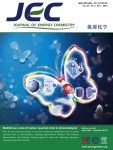
Journal of Energy Chemistry
Scope & Guideline
Catalyzing Knowledge in Energy Systems
Introduction
Aims and Scopes
- Energy Storage Systems:
Research on various energy storage technologies, including batteries (lithium-ion, sodium-ion, zinc-ion, etc.), supercapacitors, and hybrid systems, focusing on performance enhancement, cycle stability, and safety. - Electrocatalysis and Fuel Cells:
Investigation into electrocatalytic processes and fuel cell technologies, aiming to improve efficiency and reduce costs for applications in hydrogen production, CO2 reduction, and overall energy conversion. - Photovoltaic Materials and Devices:
Development of advanced photovoltaic materials, including perovskite solar cells and organic photovoltaics, with a focus on improving efficiency, stability, and scalability of solar energy conversion. - Nanomaterials for Energy Applications:
Utilization of nanostructured materials to enhance the performance of energy-related devices, including catalysts, electrodes, and membranes, through improved surface area and reactivity. - Sustainable Energy Chemistry:
Research aimed at understanding and developing sustainable pathways for energy production and conversion, including biomass conversion, CO2 utilization, and the design of eco-friendly materials. - Interface Engineering and Device Integration:
Studies focusing on the optimization of interfaces in energy devices to enhance performance and stability, including solid-electrolyte interfaces in batteries and charge transport layers in solar cells.
Trending and Emerging
- Advanced Battery Technologies:
Research efforts are increasingly focused on developing high-performance batteries, including solid-state batteries, sodium-ion, and lithium-sulfur systems, emphasizing enhanced energy density and safety. - Electrocatalysis for Green Hydrogen Production:
There is a growing trend in electrocatalysis research aimed at improving hydrogen production from renewable sources, with a focus on optimizing catalysts for water splitting and CO2 reduction. - Perovskite and Hybrid Solar Cells:
Perovskite solar cells are at the forefront of photovoltaic research, with significant advancements in efficiency and stability, leading to increased interest in hybrid systems and scalable production methods. - Nanotechnology in Energy Conversion and Storage:
The integration of nanomaterials in energy devices is a burgeoning area of interest, focusing on improving charge transport, catalytic activity, and overall device performance through innovative nanostructures. - Sustainable Energy Materials:
Research is increasingly directed towards developing materials that are not only efficient but also sustainable, including the use of biomass-derived materials and recyclable components in energy devices. - Machine Learning and Data-Driven Approaches:
The application of machine learning techniques to optimize materials and processes in energy chemistry is emerging as a significant trend, facilitating rapid discovery and innovation in energy technologies.
Declining or Waning
- Conventional Fossil Fuel Catalysis:
Research on traditional catalysis for fossil fuel processing has waned as the journal increasingly emphasizes renewable energy sources and sustainable alternatives. - Basic Theoretical Studies:
Papers focusing solely on theoretical or computational studies without experimental validation have decreased, as there is a growing preference for applied research with practical outcomes. - Single-Use Energy Devices:
The focus on single-use energy devices, such as disposable batteries or fuel cells, has diminished in favor of developing sustainable, rechargeable systems that align with environmental goals. - Low-Efficiency Organic Solar Cells:
Research on low-efficiency organic solar cells has declined as advancements in perovskite and other high-efficiency materials take precedence in the pursuit of better photovoltaic technologies. - Low-Capacity Energy Storage Solutions:
There is a noticeable decrease in interest in low-capacity energy storage solutions, as the journal shifts towards exploring high-capacity, high-performance alternatives.
Similar Journals

Electrochemical Energy Reviews
Illuminating Pathways to Sustainable Energy AdvancesElectrochemical Energy Reviews, published by SpringerNature, serves as an essential platform for the dissemination of cutting-edge research in the fields of electrochemistry, material science, and energy engineering. With an impressive impact factor and ranked in the Q1 category across multiple disciplines including Chemical Engineering and Energy Technology, this journal highlights its commitment to advancing knowledge and innovation within the energy sector. Operating since 2018, the journal not only provides a valuable resource for researchers and professionals but also invites contributions from students and emerging scholars interested in the pivotal role of electrochemical processes in sustainable energy solutions. Published in Germany and widely accessible to the global research community, Electrochemical Energy Reviews is an indispensable reference for those keen on exploring the future of energy technologies.

Joule
Exploring New Frontiers in Energy ScienceJoule, published by CELL PRESS, is a premier journal dedicated to the rapidly evolving field of energy research. Since its inception in 2017, Joule has established itself as a leading source of high-impact studies in energy, achieving an outstanding Q1 ranking in the Energy (miscellaneous) category and ranking #1 out of 73 in the general energy field, placing it within the 99th percentile according to Scopus metrics. The journal aims to advance the understanding of diverse energy forms and their applications, providing a platform for significant breakthroughs that can drive sustainable practices and innovative technologies. Through rigorous peer review and expert contributions, Joule serves as an invaluable resource for researchers, professionals, and students engaged in tackling some of the most pressing energy challenges of our time. Based in the United States, Joule continues to foster collaboration and interdisciplinary approaches in energy research, striving to illuminate pathways toward a sustainable future.

Journal of Power Sources Advances
Driving Progress in Power Sources and SustainabilityJournal of Power Sources Advances, published by ELSEVIER, stands at the forefront of innovative research within the fields of Electrochemistry, Energy Engineering and Power Technology, and Materials Chemistry. Having established itself as an Open Access journal since 2020, it aims to disseminate knowledge rapidly and widely among researchers, professionals, and students interested in the latest advancements in power sources technology. With an impressive impact factor and recognition as a Q1 journal in 2023 across multiple categories, it addresses key challenges and innovations in energy generation, storage, and materials development. The journal's commitment to high-quality, peer-reviewed content fosters a vibrant community for discussing breakthroughs that hold the potential to transform energy systems globally. The journal operates out of the Netherlands, enhancing its global outreach, while its strong Scopus rankings highlight its influential role in driving research within its scope. Journal of Power Sources Advances is the pivotal resource for those dedicated to shaping the future of energy sustainability and technology.
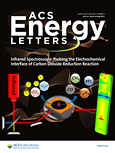
ACS Energy Letters
Illuminating the Path to Sustainable Energy SolutionsACS Energy Letters, published by the American Chemical Society, is a prestigious peer-reviewed journal designed to disseminate innovative and impactful research in the multifaceted field of energy science. Since its inception in 2016, the journal has quickly ascended to a remarkable status, achieving Q1 rankings in critical categories including Chemistry (miscellaneous), Energy Engineering and Power Technology, Fuel Technology, Materials Chemistry, and Renewable Energy, Sustainability and the Environment as of 2023. With an emphasis on rigorous research methodologies and interdisciplinary collaboration, ACS Energy Letters serves as a vital platform for scholars, professionals, and students to explore cutting-edge research that addresses contemporary energy challenges. While maintaining a commitment to advancing knowledge without open access, it offers profound insights into sustainable practices and innovative solutions that are crucial for the future of energy systems globally. The journal's esteemed standing in the chemical and energy sectors underscores its significance, making it an essential resource for anyone invested in the advancement of energy technologies and sustainable practices.
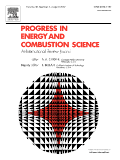
PROGRESS IN ENERGY AND COMBUSTION SCIENCE
Fueling the future with cutting-edge research.PROGRESS IN ENERGY AND COMBUSTION SCIENCE, published by PERGAMON-ELSEVIER SCIENCE LTD, stands as a premier journal in the realms of energy engineering and fuel technology, with an impressive impact factor and recognition across multiple scientific disciplinary matrices. Since its inception in 1975 and continuing through 2024, this esteemed publication has contributed significantly to the advancement of knowledge in energy resources, combustion processes, and their applications in modern technology. With a robust ranking of Q1 in key categories such as Chemical Engineering, Energy Engineering and Power Technology, and Fuel Technology, the journal consistently showcases high-quality research that influences both academia and industry. Researchers, professionals, and students benefit from its rigorous peer-reviewed articles, which foster a deeper understanding of energy-related challenges and innovations. Although it is not an Open Access outlet, its relevance and contribution to the scientific community are undeniable, making it a vital resource for anyone engaged in the pursuit of sustainable energy solutions.
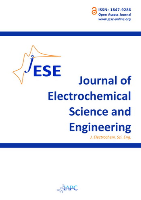
Journal of Electrochemical Science and Engineering
Catalyzing Progress in Electrochemical Science and Engineering.The Journal of Electrochemical Science and Engineering, published by the International Association of Physical Chemists (IAPC), serves as a vital resource for researchers and professionals in the fields of electrochemistry, materials chemistry, and chemical engineering. With an Open Access model since 2011, this journal ensures that groundbreaking research is freely accessible to a global audience, promoting collaboration and knowledge sharing. Situated in Croatia, it showcases cutting-edge developments while focusing on applied aspects related to electrochemical technologies. Notably, the journal holds a commendable Scopus ranking, placing it within the Q3 quartile for multiple categories, including Chemical Engineering (miscellaneous) and Electrochemistry. By fostering innovative research and comprehensive reviews, the Journal of Electrochemical Science and Engineering plays a crucial role in advancing the understanding and application of electrochemical processes, making it an indispensable platform for academics and practitioners alike.
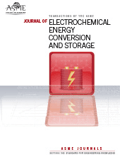
Journal of Electrochemical Energy Conversion and Storage
Empowering Energy Engineering for TomorrowThe Journal of Electrochemical Energy Conversion and Storage, published by ASME, is a premier platform for cutting-edge research in the fields of electrochemistry, energy engineering, and materials science. With an ISSN of 2381-6872 and an E-ISSN of 2381-6910, this journal aims to disseminate high-quality articles that contribute to the understanding and application of energy conversion and storage technologies. Notably recognized in the 2023 Category Quartiles as Q2 in multiple categories including Electronic, Optical and Magnetic Materials, Energy Engineering and Power Technology, and Mechanical Engineering, it reflects a strong academic impact within its field. The journal also boasts competitive Scopus rankings, highlighting its relevance and influence across disciplines. Operating under an open access model, the journal ensures that research findings are widely accessible, fostering collaboration and innovation among researchers, professionals, and students globally. As we move toward a more sustainable future, the Journal of Electrochemical Energy Conversion and Storage plays a critical role in advancing technologies that promise to reshape how we harness and utilize energy.

SusMat
Elevating Knowledge in Sustainable MaterialsSusMat is a pioneering open access journal published by WILEY, with an ISSN of 2766-8479 and E-ISSN of 2692-4552, dedicated to advancing knowledge in the field of sustainable materials and technologies. Launched in 2021, SusMat aims to provide a vibrant platform for researchers, professionals, and students from interdisciplinary backgrounds to explore and disseminate innovative materials and strategies that promote sustainability. With an emphasis on high-quality, peer-reviewed research, this journal contributes to the growing body of literature essential for addressing contemporary environmental challenges. Furthermore, the open access format enhances accessibility and dissemination of knowledge, encouraging broader engagement and collaboration within the scientific community. Discover the future of sustainable materials at SusMat, where impactful research meets global sustainability goals.
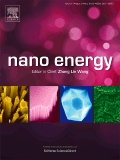
Nano Energy
Transforming Energy Landscapes with Cutting-Edge ResearchNano Energy is a premier journal published by Elsevier, focused on the dynamic intersection of nano-technology and energy solutions. Since its inception in 2012, this high-impact journal has made significant strides in advancing research across multiple disciplines, showcasing groundbreaking studies in Electrical and Electronic Engineering, Materials Science, and Renewable Energy. With an impressive Impact Factor that places it in the Q1 category of these fields—including a distinguished rank of #6 in Electrical Engineering and #9 in Renewable Energy on Scopus—the journal serves as a vital resource for academics and practitioners alike. Nano Energy aims to disseminate innovative research and developments that contribute to the sustainable energy landscape, thereby addressing pressing global energy challenges. Researchers and professionals seeking to stay at the forefront of nanotechnology applications in energy generation and efficiency will find this journal an indispensable platform for sharing knowledge and driving impact.

eScience
Advancing Sustainable Solutions Through Innovative ResearcheScience, published by KEAI PUBLISHING LTD, is an innovative open-access journal that has rapidly established itself as a leading platform in the fields of Electrochemistry, Materials Chemistry, and Renewable Energy, Sustainability, and the Environment. Since its inception in 2021, eScience has garnered recognition for its high-quality research, achieving an impressive Q1 ranking in each of its primary categories as of 2023. With a remarkable Scopus ranking—placing it among the top percentile of journals in these disciplines—eScience serves as an essential resource for researchers and practitioners aiming to advance knowledge and application in sustainable practices and materials innovation. As an open-access journal, eScience supports widespread dissemination of vital research, ensuring accessibility for all, which is critical in addressing contemporary global challenges. The journal's commitment to fostering interdisciplinary dialogue and collaboration positions it as a cornerstone for those dedicated to pushing the boundaries of scientific discovery.